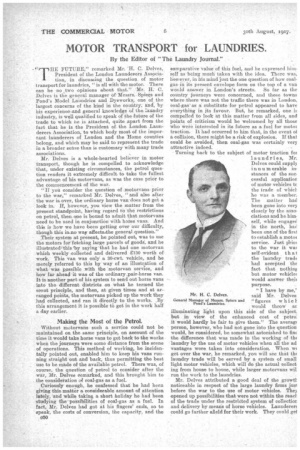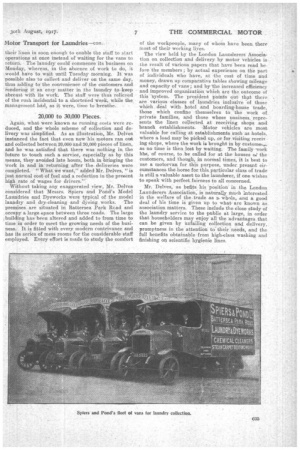MOTOR TRANSPORT for LAUNDRIES.
Page 6

Page 7

If you've noticed an error in this article please click here to report it so we can fix it.
By the Editor of "The Laundry journal."
' HE FUTURE," remarked Mr. H. C. Delves, tion, in discussing the question of motor transport for laundries, "is all with the motor. There can be no two opinions about that." Air. H. C. Delves is the general manager of ' Messrs: Spites and Pond's Model Laundries and Dyeworks, one of the largest concerns of the kind in the country. and, by his experience .and general knowledge of the laundry industry, is well qualified to speak of the future of the trade to which he is attached, quite Apart from the fact that he is the President of the London Launderers Association, to which body most of the important launderers of London and the Home counties belong, and which may be said to represent the trade in a broader sense than is customary with many trade associations. , Mr. Delves is a whole-hearted believer in motor transport, though he is compelled to acknowledge that, under existing circumstances, the petrol question renders it extremely difficult to take the fullest advantage of his enotorvans, as was the case prior to the commencement of the war.
"If you consider the question of motorvans prior to the war," remarked Mr. Delves, " and also after the war is. over, the ordinary horse van does not get a look in. If, however, you view the matter from the present standpoint, having regard to the restrictions on petrol, then one is bound to admit that motorvans need to be used in conjunction with horse vans. And this is how we have been getting over our difficulty, though this in,no way affectesthe general question." Their system at present, he pointed out, was to use the motors for fetching large parcels of goods', and he illustrate&this 'by saying'that he had one motorvan which weekly collected and delivered £130 worth of work. This van was only a 30-cwt. vehicle, and he merely referred to this by way of an illustration of what was possible with the •motorvan service, and how far ahead it was of the ordinary ,pair-horse van. It is another part of his system to send out horse vans into the different districts on what he termed the scout principle, and then, at given times and at arranged points, the motorvans picked up the work they had collected, and ran it directly to the works. ,By this arrangement it is possible to get in the work half a day earlier. .
Making the Most of the Petrol.
Without motorvans such a service could not be maintained on the same principle, on account of the time it would take horse vans to get back to the works when the journeys were some distance from the scene of operations. This method of working, he incidentally pointed out, enabled him to keep his vans running straight out and back,thus permitting the best use to be made ofthe available petrol. There was, of course, the question of petrol to consider after the war, Mr. Delves -remarked, and this brought him to the consideration of coal-gas as a fuel.
Curiously enough, he confessed that he had been giving this matter a considerable amount of attention lately, and while taking a, short holiday he had been studying the possibilities of coal-gas as a fuel. In fact, Mr. Delves had got at his fingers' ends,_ so to speak, the costs of conversion, the capacity, and the 030 eomparative value of this fuel, and he expressed himself as being much taken with the idea. There was, however, in his mind just the one question of how coal gas in its present envelope form on the top of a van would answer in London's streets. So far as the country journeys were concerned, and these towns where there was not the traffic there was in London, coal-gasas a substitute for petrol appeared to have everything in its favour. But, he remarked, one is compelled to look at this matter from all sides, and points of criticism would be welcomed by all those who were interested in its future as a fuel for motor traction. It had occurred to him that, in the event eel a collision, there might be a risk of explosion. If that could be avoided, then coat-gas was certainly very attractive indeed.
Turning back to the subject of motor traction foi laundries, Mr.
Delves could supply innum eerable in. stances of the suc cessful application of motor vehicles tc the trade of whict he was a member.
The matter had been gone into very closely by the nes& ciations and he himself, while engaged in the north, had been one of the first to establish a rnotoe service. Just frio to the war it was self-evident that the laundry trade had accepted the fact that nothing but motor vehicles would answer theie purpose.
"I have by me,' said Mr. Delves "figures w hic would throw ar illuminating light upon this side of the subject.
but in view of the enhanced cost of petro: it would hardly be fair to give them." The average person, however, who had not gone into the question would, he considered, be somewhat astonished to fine the difference that was made in the working of the laundry by the use of motor vehicles when all the ad vantages were taken into consideration. When we get over the war, he remarked, you will see that the laundry trade will be served by a system of small light motor vehicles, which will do the actual collect jug from house to house, while larger motorvans wil run the work to the laundries.
Mr. Delves attributed a good deal of the groevtl noticeable in respect of the large laundry firms jusi before the war to the use of motor vehicles. They opened up possibilities that were not within the react of the trade under the restricted system of collectior and delivery by means of horse vehicles. Launderers could go farther afield for their work. They could gel their linen in soon enough to enable the staff to start operations at once instead of waiting for the vans to return. The laundry could commence its business on Monday, whereas, in the absence of work to do, :t would have to wait until Tuesday .morning. It was possible also to collect and deliver on the same day, thus adding to the convenience of the customers and rendering it an easy matter in the laundry to -keep abreast with its work. The staff were thus relieved of the rush incidental to a shortened week, while the management had, as it were, time to breathe.
20,000 to 30,000 Pieces.
Again, what were known as running costs were reduced, and the whole scheme of collection and delivery was simplified. As an illustration, Mr. Delves instanced the fact that even now his motors ran oat and collected between 20,000 and 30,000 pieces of linen, and he was satisfied that there was nothing in the future to touch such a service, especially as by this means, they avoided late hours, both in bringing the work in and in returning after the. deliveries were completed. "What we want," added Mr. Delves, "is just normal cost of fuel and a redUction in the present high rate of wages for drivers.'
Without taking any exaggerated view, Mr. 'Delves considered that Messrs. Spiess and Pond's Model Laundries and Dyeworks were typical of the model laundry and dry-cleaning and dyeing works. The premises are situated in Battersea Park Road and occupy a large space between three roads. The large building has been altered and added to from time to time in order to meet the growing needs of the bugness. It is fitted with every modern contrivance and has its series of mess rooms for the considerable staff employed. Every effort is made to study the comfort of the workpeople, many of whom have been there most of their working lives.
The view held by the London Launderers Association on collection and delivery by motor vehicles is the result of various papers that have been read be. fore the members; by actual experience On the part of individuals who have, at the cost of time and money, drawn up comparative tables showing mileage and capacity a vans ; and by the increased efficiency and improved organization which are the outcome of this System. The president peints out that there are various classes of laundries inclusive of those which, deal with hotel and boarding-house trade, those which confine themselves to the work of private families, and those whose business represents the linen collected at receiving shops and branch establishments. -Motor vehicles are most valuable for calling at establishments such as hotels, where a load may be picked up, or for visiting receiv ing shops, where the work is brought in by custorne, as no time is then lost by waiting. The family -vork h'as, of course, to be called for at the houses ts.1 the customers, and though, in normal times, it is best to use a motorvan for this pqrpose, under present circumstances the .horse for this, particular class of trade is still a valuable asset to the.launclorer, if one wishes to speak with perfect fairness to all concerned.
Mr. Delves, as befits his position in the London Launderers Association, is naturally Much interested in the welfare of the trade as a. whole, and a good deal of his time is given up to what are known as association matters. These include the close study of the laundry service to the -public at large, in order that householders may enjoy all the advantages that can be given by unfailing collection and delivery, promptness in the attention to their , needs, and the full benefits obtainable from high-class washing and finishing on scientific hygienic lines.






















